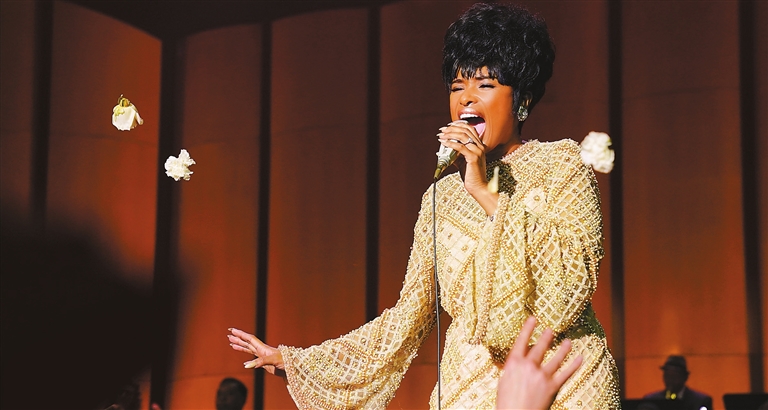
Aretha Franklin chose Jennifer Hudson to play her in a dramatic feature based on her life, and Hudson repays that act of faith by honoring the late singer’s towering legacy in “Respect.” A powerful account of self-actualization spanning 20 formative years, director Liesl Tommy’s biopic is also an intimate gift of love, rich in complexity, spirituality, Black pride and feminist grit rooted in true experience. More tightly focused in its time frame than Nat Geo’s recent anthology season “Genius: Aretha,” which starred Cynthia Erivo, “Respect” begins with the singer’s preteen years in 1952 Detroit and wraps with her live church recording of the gospel album, “Amazing Grace,” two decades later. The screenplay by Tracey Scott Wilson records the initially faltering rise to fame, as expected, but it gives equal attention to Blackness, family and the church, three foundational building blocks very much instrumental in shaping Franklin as an artist. What distinguishes the story from most musical biopics is the fact that Aretha (played as a child by Skye Dakota Turner) was directly exposed from a young age to influential artists counted as family friends. Among them were Sam Cooke, Ella Fitzgerald, Mahalia Jackson and Dinah Washington, the latter played with fiery command by Mary J. Blige in a pivotal scene of brutally straight-talking mentorship. A child prodigy, Aretha was regularly yanked out of bed by her Baptist minister father, Rev. C.L. Franklin (Forest Whitaker), to sing at late-night parties full of sophisticated guests. “She’s 10, but her voice is goin’ on 30, honey,” says one of them. While her parents separated early in her life, her mother Barbara (Audra McDonald), who was also an accomplished singer, was a major inspiration. In a scene during a weekend visit, McDonald wraps her heavenly voice around “I’ll Be Seeing You” while mother and daughter catch up at the piano. But the shock of Barbara’s sudden death threatens to silence Aretha. The closeness with her sisters, Carolyn (Hailey Kilgore) and Erma (Saycon Sengbloh), is depicted as another source of anchoring female solidarity. By the time the central role transitions mid-song from Turner to Hudson, Aretha is already a mass of contradictions. Having performed as a soloist both at her father’s church and on the Baptist touring circuit, she has the poise and command to sing in front of huge audiences. And her father’s friendship with Martin Luther King Jr. (Gilbert Glenn Brown), a man she knows as “Uncle Martin,” feeds her desire for social justice. But C.L. is still hyper-controlling — of her participation in civil rights protests, her professional choices, even her love life. The latter element is complicated by her refusal to name the father of her two children, the first born when she was not yet 13, a trauma that haunts her throughout. Her years recording at Columbia in the early ’60s yield a string of albums but no hits as she attempts to make her mark as a jazz artist. When she finally breaks away from her father’s iron grip, it’s with another domineering man, Ted White (Marlon Wayans), a charmer who becomes her husband and manager. The first to trust in Aretha’s unerring instincts about her sound is producer Jerry Wexler (Marc Maron, terrific); once he moves her to Atlantic Records and puts her in an Alabama studio with the Muscle Shoals band, the hits start coming. The storytelling loses some fluidity in the later sections after Aretha begins a relationship with tour manager Ken Cunningham (Albert Jones). Despite the stability of finally being with an emotionally supportive man, her excessive drinking starts causing friction with her family, including a falling out with her sisters. (SD-Agencies) | 
